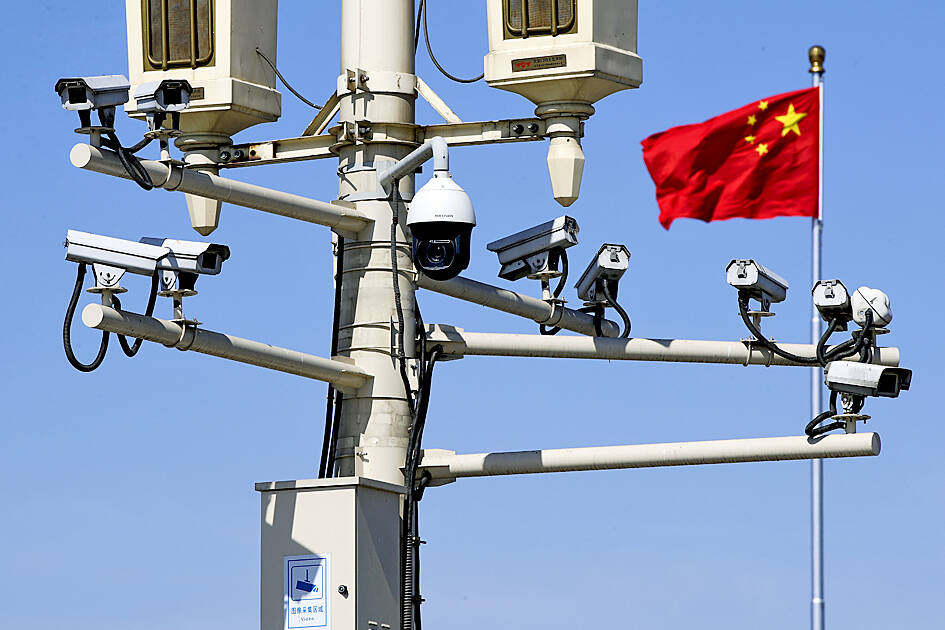Harsher penalties are needed to deter espionage and selling of classified materials to China, military officials and legal experts said on Armed Forces Day on Wednesday last week.
Punishments are far too lenient, with people convicted of spying — including retired and active-duty officers who cooperate with Chinese operatives to pass on high-level government and military files, typically receiving sentences of only one to four years, former Military Intelligence Bureau (MIB) director Liu De-liang (劉德良) told Chinese-language media.
Liu cited the case of Chinese military officer Zhen Xiaojiang (鎮小江), who posed as a Hong Kong businessman on trips to Taiwan beginning in 2007.

Photo: AP
Zhen cultivated ties with military personnel, offered cash to recruit them and obtained classified materials to build a spy network. He was arrested in 2014 along with several Taiwanese, including retired air force colonel Ke Chi-hsien (葛季賢) and retired army major general Hsu Nai-chuan (許乃權).
After multiple trials and appeals, Zhen was sentenced to just four years in prison for contraventions of the National Security Act (國家安全法) before being deported upon release, while Hsu received only a two-year term for engaging in espionage, Liu said, adding that in a retrial, the High Court overturned Ke’s guilty verdict and acquitted him.
The case, regarded as one of the largest Chinese espionage networks uncovered in Taiwan, implicated numerous retired and active-duty personnel, yet after years of hearings and trials, most of those convicted received only lenient terms of one to four years, Liu said.
Such light punishments have no deterrent effect, but instead risk encouraging corrupt officials to engage in espionage for personal gain, knowing that even if caught, they would face minimal consequences, he said.
In a separate case, former colonel Chang Chao-jan (張超然), a former MIB official, was sent to China on a mission, but defected after being swayed by financial inducements.
He returned to Taiwan and recruited three former MIB colleagues.
The group was arrested and convicted on espionage charges, but after appeals, Chang was sentenced earlier this year to only 18 months in prison, while two of his three accomplices received terms of 14 months and 10 months, and the other was acquitted, Liu said.
There is also alarming inconsistency in sentencing, he said.
Former army major general Lin Cheng-chia (林承家) was convicted of corruption in 2023 for misappropriating a washing machine valued at just NT$7,990 and was sentenced to six years and eight months in jail after appeal, far harsher than the punishments imposed on Zhen, Chang and their associates in espionage cases that posed direct threats to national security, Liu said.
“These situations have led the public to question whether Taiwan’s judicial system truly understands the gravity of national security threats,” he said. “Legal experts agree that such lenient sentencing risks encouraging further acts of betrayal and heightens the danger of Chinese espionage undermining our government and military.”
Attorney Su Yu-min (蘇育民) said that most espionage cases are uncovered when operatives are caught passing classified materials, which provides evidence of intent, but does not always allow authorities to fully assess the actual damage caused.
It often leads courts to impose lighter sentences compared with corruption cases, where the financial harm and asset values are more easily quantified, he added.
“To address this gap, judges should undergo training on national security and civil defense, so they can better appreciate the stakes in contingency scenarios,” Su said. “Such courses should not only be for members of the judiciary, but should also be offered to all citizens, to strengthen awareness of homeland defense.”
“The courts’ practice of handing down light sentences in espionage cases inevitably encourages some to accept Chinese approaches when enticed by financial rewards,” Liu said. “We therefore recommend amending the law to impose harsher punishments, including for attempted espionage, to deter such behavior and counter the perception of judicial inconsistency.”
Democratic Progressive Party Legislator Chuang Jui-hsiung (莊瑞雄) told reporters that he shared the concerns.
The judiciary “has got it all wrong,” Chuang said, citing the imposition of a multi-year prison term in the washing machine case, while Zhen got four years.
“Since last year, espionage cases have risen to 64, with military personnel accounting for 70 percent — evidence that China is ramping up efforts to infiltrate the armed forces,” Chuang said.
With courts continuing to hand down lenient sentences, “it is as if we are inviting Beijing to come party in Taiwan,” he said.
Chuang called for amendments to the National Security Act to elevate espionage to a more serious offense and impose heavier penalties to create more effective deterrence.
He also urged stronger national security education for judges to prevent “harsh sentences for corruption, but leniency for treason.”

The Chinese military has built landing bridge ships designed to expand its amphibious options for a potential assault on Taiwan, but their combat effectiveness is limited due to their high vulnerability, a defense expert said in an analysis published on Monday. Shen Ming-shih (沈明室), a research fellow at the Institute for National Defense and Security Research, said that the deployment of such vessels as part of the Chinese People’s Liberation Army (PLA) Navy’s East Sea Fleet signals a strong focus on Taiwan. However, the ships are highly vulnerable to precision strikes, which means they could be destroyed before they achieve their intended

About 4.2 million tourist arrivals were recorded in the first half of this year, a 10 percent increase from the same period last year, the Tourism Administration said yesterday. The growth continues to be consistent, with the fourth quarter of this year expected to be the peak in Taiwan, the agency said, adding that it plans to promote Taiwan overseas via partnerships and major events. From January to June, 9.14 million international departures were recorded from Taiwan, an 11 percent increase from the same period last year, with 3.3 million headed for Japan, 1.52 million for China and 832,962 to South Korea,

SOVEREIGNTY: The rigs show that Beijing ‘rejects Taiwan’s jurisdiction’ by building in areas where Taipei demands permission to build or alter installations Chinese oil rigs have been sighted just 26 nautical miles (42km), from Taiwan’s exclusive economic zone (EEZ) near Pratas Island (Dongsha Island, 東沙島), posing a threat to Taiwan’s sovereignty if left unchallenged, a brief published by the Jamestown Foundation on Tuesday said. Pratas Island, 444km from Kaohsiung, is northeast of the South China Sea and houses a Taiwanese garrison. The brief, titled “Rigging the Game: PRC Oil Structures Encroach on Taiwan’s Pratas Island” — referring to the People’s Republic of China — analyzed photographs and said that Beijing’s tools to pressure Taiwan now include oil rigs. “Oil rigs now constitute part of Beijing’s

The Taiwan Experience Education Program (TEEP) has funded short-term internships in Taiwan for more than 4,500 young people from more than 40 countries since 2015, with the goal of attracting and retaining international talent, the Ministry of Education said yesterday. Fifty-five colleges launched 514 projects this year, including in fields such as semiconductors, artificial intelligence, medicine and biotechnology, green energy, and sustainability, it said. The program provides research and practical internships in Taiwan for two to six months, and offers cultural exchange and networking opportunities, the ministry said. For example, National Formosa University’s Embedded System and Autopilot Laboratory developed two solar-powered drones in